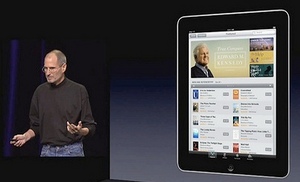 Only days away from Apple’s launch of its new iPad product, it has purchased the iPad trademark from Fujitsu. When Apple announced the product’s iPad mark, Fujitsu quickly laid claim to the trademark, which was filed in 2003, but has yet to register. In order to avert any interruption in iPad’s distribution, Apple apparently believed it should just purchase the trademark instead of engaging in a protracted trademark battle.
Only days away from Apple’s launch of its new iPad product, it has purchased the iPad trademark from Fujitsu. When Apple announced the product’s iPad mark, Fujitsu quickly laid claim to the trademark, which was filed in 2003, but has yet to register. In order to avert any interruption in iPad’s distribution, Apple apparently believed it should just purchase the trademark instead of engaging in a protracted trademark battle.
“Hey Ya’ll!” Chef Paula Deen Sued For Trademark Infringement Over “Butter Bell”
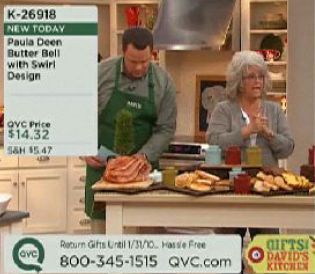 Santa Ana, CA – The Southern-style chef Paula Deen has made “Hey Ya’ll!” her trademark phrase on the Food Network, while refusing to make anything remotely healthy that excludes her beloved butter, cheese, and fried foods. Maybe because of her love of butter, however, she has been sued for trademark infringement for selling cooking accessories under the “Butter Bell” trademark.
Santa Ana, CA – The Southern-style chef Paula Deen has made “Hey Ya’ll!” her trademark phrase on the Food Network, while refusing to make anything remotely healthy that excludes her beloved butter, cheese, and fried foods. Maybe because of her love of butter, however, she has been sued for trademark infringement for selling cooking accessories under the “Butter Bell” trademark.
Plaintiff registered its Butter Bell® trademark with the U.S. Patent and Trademark Office in 2002, and has since become incontestable. Plaintiff initially used its Butter Bell® mark on ceramic crocks, but has since expanded its line of goods to include gourmet food related products. Plaintiff contends that its Butter Bell® products are sold through numerous channels, including on the Food Network and Paula Deen’s own “Cooking with Paula Deen” magazine.
Plaintiff alleges that QVC is a significant customer of its Butter Bell® products, where Paula Deen appeared to promote and market the infringing crock product. Plaintiff further contends that Defendants previously asked the Plaintiff to develop a Butter Bell® product which included a Paula Deen logo. Thus, Plaintiff alleges that Defendants’ infringement is willful and intentional.
Aram Saroyan Sues Over Copyright Ownership Of “Come On A My House” Song
Los Angeles, CA – William Saroyan, the Academy Award and Pulitzer Prize winning author and screenwriter, co-wrote “Come On-A My House” with his cousin Ross Bagdasarian, the creator of “Alvin and the Chipmunks.”
https://www.youtube.com/watch?v=x-7otAzrR0I
Saroyan’s son and sole heir, Aram, alleges ownership of fifty percent of the copyright in the song by his 2006 termination – under 17 U.S.C. 304(c) – of an earlier transfer from his father to Continue reading ›
Kirby Heirs Sue Marvel And Disney To Terminate Comic Book Copyrights In Iron Man, Spider Man, Hulk, etc.
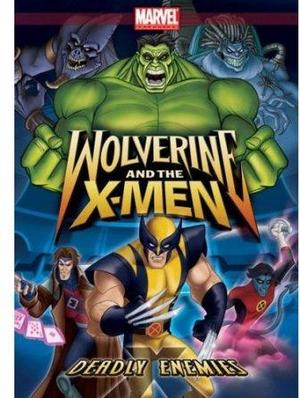 Central District of California – Comic book author Jack Kirby’s heirs are suing Marvel and Disney (complaint available here) to terminate the copyrights in the popular Spider Man, Iron Man, X-Men, The Fantastic Four, The Incredible Hulk, The Avengers, Thor, Nick Fury and Ant-Man comics, which Kirby authored or co-authored between 1958 and 1963. Plaintiffs allege that during this period, Kirby was not an employee of any of Marvel’s predecessors and the works were not a work-for-hire because he was a freelancer without any written agreements. In 1972, Marvel’s predecessor, Magazine Management Co., entered into a written agreement with Kirby whereby the copyrights in Kirby’s works were assigned for additional compensation.
Central District of California – Comic book author Jack Kirby’s heirs are suing Marvel and Disney (complaint available here) to terminate the copyrights in the popular Spider Man, Iron Man, X-Men, The Fantastic Four, The Incredible Hulk, The Avengers, Thor, Nick Fury and Ant-Man comics, which Kirby authored or co-authored between 1958 and 1963. Plaintiffs allege that during this period, Kirby was not an employee of any of Marvel’s predecessors and the works were not a work-for-hire because he was a freelancer without any written agreements. In 1972, Marvel’s predecessor, Magazine Management Co., entered into a written agreement with Kirby whereby the copyrights in Kirby’s works were assigned for additional compensation.
Because the works were created before 1978, Plaintiffs assert that they can terminate the transfer Kirby’s copyrights under 17 U.S.C. § 304(c). Thus, Plaintiffs provided Defendants with termination notices on September 16, 2009. The copyrights are scheduled to revert to the heirs beginning in 2014, which defendants expectedly refute. As a result, Plaintiffs request a declaration from the Court that the termination notices were proper and that the copyright interests will be recaptured. In addition, Plaintiffs ask the Court to determine the split of royalties from co-owned works moving forward. Further, Plaintiffs seek the return of Kirby’s original artwork that is currently in Defendants’ possession. Finally, Plaintiffs assert a Lanham Act cause of action for Defendants’ failure to accredit Kirby as the author or co-author of the underlying works on which X-Men Origins: Wolverine and The Incredible Hulk movies were based. The case is Kirby v. Marvel Entertainment, Inc., SACV10-00289 CJC (C.D. Cal. 2010).
Marvel Entertainment has also sued Kirby’s heirs in the Southern District of New York. Details here.
Music Group “The Heavy,” CBS, and NFL Sued For Copyright Infringement Over “How You Like Me Now?” Song
Los Angeles, CA – Drive-In Music Company sued the musical group “The Heavy,” CBS, NFL and others for copyright infringement. In 1969, Arlester Christian wrote the musical composition entitled “Let a Woman Be a Woman, (and Let a Man Be a Man),” which was registered with the U.S. Copyright Office. All the rights to the song were then assigned to Plaintiff in the same year. Here’s the Plaintiff’s musical composition:
The NFL and CBS became defendants for airing a KIA car commercial incorporating The Heavy’s song during the Super Bowl®. Plaintiff alleges that the infringement is willful and intentional and demands enhanced damages and attorneys’ fees. I will go out on a limb and predict that this case will settle quickly. The case is Drive-In Music Co., Inc. v. CBS Corporation et al., CV10-01783 JFW (C.D. Cal. 2010).
Design Patent and Trademark Lawsuit Filed Against Coca Cola Over Sports Ball Shaped Beverage Bottles
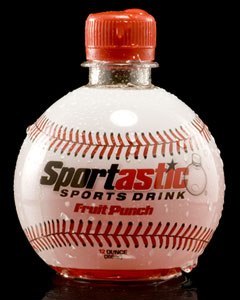 Santa Ana, CA – GT Beverage Company sued The Coca Cola Company for a declaration of no trademark or design patent infringement. BT sells beverages in bottles that are shaped like sports balls including baseballs, basketballs, soccer balls, and golf balls. BT has filed numerous trademark applications with the USPTO to register its various bottle designs.
Santa Ana, CA – GT Beverage Company sued The Coca Cola Company for a declaration of no trademark or design patent infringement. BT sells beverages in bottles that are shaped like sports balls including baseballs, basketballs, soccer balls, and golf balls. BT has filed numerous trademark applications with the USPTO to register its various bottle designs.
During the holidays, Coca Cola sells its beverages in spherical bottles shaped to be Christmas tree ornaments. Coca Cola’s bottle shape, however, was itself the subject of a prior claim of infringement by O-Company and OGO USA. In response, Coca Cola filed an opposition proceeding at the TTAB and also filed a declaratory judgment lawsuit in the Middle District of Tennessee. It appears that the parties resolved the dispute by assigning the disputed application and the resultant trademark registration – which is the subject of the instant lawsuit – to Coca Cola.
BT alleges that in September of 2009, Coca Cola sent a cease and desist letter charging infringement of the trade dress bottle design and Design Patent No. D554,523. BT responded by using Coca Cola’s previous stance against it by denying that Coca Cola had an exclusive right to round shaped bottles for beverage products. The parties’ inability to resolve the dispute resulted in this lawsuit. The case is GT Beverage Company, LLC v. The Coca Cola Company, SACV10-00209 JVS (C.D. Cal. 2010).
Upper Deck To Pay MLB To Settle Trademark Infringement Lawsuit
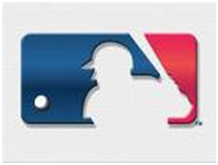 New York — Upper Deck will reportedly pay MLB a “substantial sum” in addition to $2.4 million to settle the trademark infringement and breach of contract lawsuit, according to Reuters. On January 31, 2010, Major League Baseball Properties sued the Upper Deck Company for trademark infringement, trademark dilution, unfair competition, and breach of contract because Upper Deck continued to print baseball trading cards after its license was terminated. Details blogged here.
New York — Upper Deck will reportedly pay MLB a “substantial sum” in addition to $2.4 million to settle the trademark infringement and breach of contract lawsuit, according to Reuters. On January 31, 2010, Major League Baseball Properties sued the Upper Deck Company for trademark infringement, trademark dilution, unfair competition, and breach of contract because Upper Deck continued to print baseball trading cards after its license was terminated. Details blogged here.
It appears that Upper Deck learned from its long and drawn out court battle with Konami. Only after the California District Court ruled that Upper Deck counterfeited hundreds of thousands of Yu-Gi-Oh! trading cards, did Upper Deck decide to settle on the first day of trial. Details here. Conversely, by settling early with MLB, Upper Deck can avoid possible adverse rulings and focus on reviving its business.
The case is Major League Baseball Properties, Inc. v. The Upper Deck Company, LLC, 10-cv-732-RWS (SDNY 2010).
TMZ Sued For Copyright Infringement Over Video Interview With Michael Jackson’s Ex-Wife
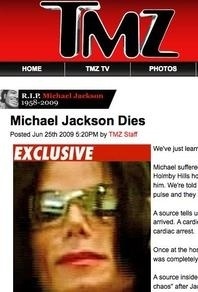 Los Angeles, CA – Celebrity gossip and news website TMZ is being sued by Marc Schaffel Productions for using copyrighted video footage of Michael Jackson’s ex-wife, Debbie Rowe, without authorization. (Here’s a copy of the copyright infringement complaint). Schaffel interviewed Rowe in 2003, portions of which were publicly aired in the same year. On January 31, 2004, the Santa Barbara County Sheriff’s office obtained the entire footage – including confidential, never released outtakes – from Schaffel’s house pursuant to a court order issued in the molestation trial.
Los Angeles, CA – Celebrity gossip and news website TMZ is being sued by Marc Schaffel Productions for using copyrighted video footage of Michael Jackson’s ex-wife, Debbie Rowe, without authorization. (Here’s a copy of the copyright infringement complaint). Schaffel interviewed Rowe in 2003, portions of which were publicly aired in the same year. On January 31, 2004, the Santa Barbara County Sheriff’s office obtained the entire footage – including confidential, never released outtakes – from Schaffel’s house pursuant to a court order issued in the molestation trial.
On July 20, 2009, after Michael Jackson’s death, TMZ is accused of broadcasting confidential outtakes of the interview with Rowe where she jokes about using sedation to combat stage fright. “Schaffel and Rowe were stunned and distressed that TMZ, in a misguided attempt at gallows humor, broadcast the Confidential Outtakes, attempting to tie a 2003 joke by Rowe about drug use to Mr. Jackson’s tragic 2009 death from a drug overdose.” Four days later, TMZ removed the footage upon Schaffel and Rowe’s request and allegedly identified the Sheriff’s office as the source of the confidential footage. The Sheriff’s office denied the accusation and TMZ then refused to identify the source of the footage: “TMZ asserts that its status as a ‘news’ provider exempts it from respecting copyrights, permits it to broadcast purloined material, and insulates it from liability for lying about sources of illicitly obtained materials.”
Schaffel asserts causes of action for copyright infringement and conversion under California law. The case is F. Marc Schaffel Productions, LLC v. TMZ Productions, Inc. et al., CV10-01306 GHK (C.D. Cal. 2010).
Court: NBC’s “My Name Is Earl” Does Not Infringe Mark Gable’s “Karma!” Copyright
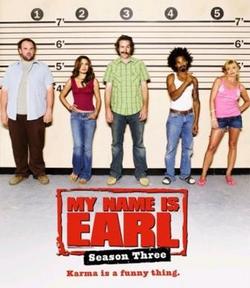 Los Angeles, CA – The District Court granted NBC’s motion for summary judgment of non-infringement in the “My Name Is Earl” copyright infringement lawsuit. (Order available here). Mark Gable filed a copyright infringement lawsuit (details blogged here) claiming that the “My Name Is Earl” television show was based on his copyrighted “Karma!” screenplay. (Details blogged here). Gable complained that he and his girlfriend sent his screenplay to The Gersh Agency in 1995, and that Ken Neisser, one of the Gersh agents who later represented Gergory Garcia, the subsequent creator of Earl, at another agency provided Garcia with a copy of Gable’s screenplay.
Los Angeles, CA – The District Court granted NBC’s motion for summary judgment of non-infringement in the “My Name Is Earl” copyright infringement lawsuit. (Order available here). Mark Gable filed a copyright infringement lawsuit (details blogged here) claiming that the “My Name Is Earl” television show was based on his copyrighted “Karma!” screenplay. (Details blogged here). Gable complained that he and his girlfriend sent his screenplay to The Gersh Agency in 1995, and that Ken Neisser, one of the Gersh agents who later represented Gergory Garcia, the subsequent creator of Earl, at another agency provided Garcia with a copy of Gable’s screenplay.
To show copyright infringement, Plaintiff had to show Defendants had access to the “Karma!” screenplay and that the works were substantially similar. The Court found that Plaintiff failed to show that Garcia had access to “Karma!”:
In sum, even generously assuming that Plaintiff’s submission of Karma! actually reached Gersh, the record is insufficient to allow a reasonable jury to infer that Garcia had access to Karma. Thus, summary judgment for Defendants is appropriate. Finally, even if the weak evidence of access were sufficient to create a triable issue of fact, Plaintiff would still have to present evidence allowing reasonable minds to conclude that Karma! and Earl are substantially similar.
Red, Red Wine Trademark Infringement Goes To My Head
 Los Angeles, CA – Santa Barbara Winery sued Foster’s Wine Estates for trademark infringement, unfair competition and cancellation of trademark registration. Plaintiff alleges that it has used the “Santa Barbara Winery” trademark since 1962, but has not – for almost 50 years – sought to register its trademark with the USPTO. Plaintiff should have read our article. The Defendant, on the other hand, has immediately sought to register its “Santa Barbara Wine Company” trademark with the USPTO, which mark shall shortly register on the Supplemental Register. Defendants would have also benefited from our article by selecting a strong trademark that would immediately register on the Principal Register.
Los Angeles, CA – Santa Barbara Winery sued Foster’s Wine Estates for trademark infringement, unfair competition and cancellation of trademark registration. Plaintiff alleges that it has used the “Santa Barbara Winery” trademark since 1962, but has not – for almost 50 years – sought to register its trademark with the USPTO. Plaintiff should have read our article. The Defendant, on the other hand, has immediately sought to register its “Santa Barbara Wine Company” trademark with the USPTO, which mark shall shortly register on the Supplemental Register. Defendants would have also benefited from our article by selecting a strong trademark that would immediately register on the Principal Register.
Plaintiff alleges that “in using the mark and label ‘Santa Barbara Wine Company’ in connection with wine offered for sale in commerce, Defendant has intentionally sought to infringe upon Plaintiff’s Santa Barbara Winery trademark, to cause confusion and mistake amongst consumers, the trade, and those who come into post-purchase contact with its goods, as to whether its goods are connected, affiliated or associated with Plaintiff, and to re-direct confused consumers to products Defendants are selling that are not affiliated with Plaintiff.”
I only recently learned that the UB40 “Red Red Wine” song was actually written by Neil Diamond. Here’s Neil Diamond’s version:
 Los Angeles Intellectual Property Trademark Attorney Blog
Los Angeles Intellectual Property Trademark Attorney Blog


